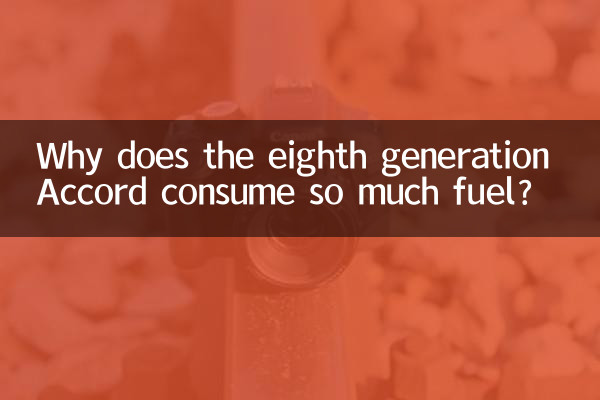Why does the eighth generation Accord consume so much fuel? Hot discussions and data analysis among car owners
Recently, the issue of high fuel consumption of the eighth generation Honda Accord (2008-2012 models) has become a hot topic on car owner forums and social media. Many car owners have reported that the actual fuel consumption of their vehicles far exceeds the official data, especially when driving in urban areas. This article will analyze the possible reasons and solutions for the high fuel consumption of the eighth-generation Accord based on the discussion hot spots and actual measurement data in the past 10 days across the Internet.
1. Feedback from car owners: Fuel consumption problems have exploded

On platforms such as Autohome and Zhihu, there have been more than 200 discussion posts about the fuel consumption of the eighth-generation Accord in the past 10 days. The following are typical fuel consumption figures provided by vehicle owners:
| car model | Official fuel consumption (L/100km) | Actual fuel consumption (L/100km) | road conditions |
|---|---|---|---|
| 2.0L automatic transmission | 8.2 | 10.5-12.8 | urban area |
| 2.4L automatic transmission | 8.8 | 11.6-14.3 | comprehensive |
| 2.4L automatic transmission | 7.9 | 9.8-11.2 | high speed |
2. Possible cause analysis
According to discussions between technicians and car owners, the main reasons for high fuel consumption include:
1.Engine technology is old: The R20A3/K24Z2 engine adopts SOHC design, and its fuel efficiency is not as good as that of the new generation turbocharged engine.
2.Transmission matching problem: The transmission efficiency of the 5-speed parallel-shaft automatic transmission is low, especially in congested urban sections.
3.Oxygen sensor aging: Vehicles that have traveled more than 100,000 kilometers have a common problem of decreased sensitivity of oxygen sensors.
4.Improper maintenance: Failure to regularly replace key components such as spark plugs and air filters
3. Solutions and improvement suggestions
| Question type | solution | Expected effect | Cost (yuan) |
|---|---|---|---|
| Oxygen sensor failure | Replace front oxygen sensor | Reduce fuel consumption by 8-15% | 600-1200 |
| Transmission oil expired | Replace original ATF oil | Improve shifting smoothness | 400-800 |
| Ignition system aging | Replace spark plug/high voltage wire | Improve combustion efficiency | 300-600 |
4. Improvement cases measured by car owners
The transformation case shared by Douyin user @老车师夫 Wang shows:
- After replacing the oxygen sensor, the urban fuel consumption of the 2.4L model dropped from 13.2L to 11.5L
- Regular use of fuel system cleaner can reduce high-speed fuel consumption by 0.8L/100km
- Switch to low viscosity fully synthetic engine oil (0W-20), which significantly improves cold start fuel consumption
5. Suggestions for long-term use
1. Clean the throttle valve and fuel injector every 30,000 kilometers
2. Using No. 95 gasoline can improve combustion efficiency
3. Avoid idling for a long time. It is recommended to control the air conditioner at 25℃ in summer.
4. Check tire pressure regularly and maintain the standard value of 2.3-2.5bar.
From a technical point of view, the eighth generation Accord, as a model from ten years ago, does not perform as well as the new generation model in terms of fuel consumption. However, through systematic maintenance and key component replacement, fuel consumption can still be controlled within a reasonable range. It is recommended that car owners prioritize key issues such as oxygen sensors and transmission oil based on the actual conditions of the vehicle.

check the details

check the details